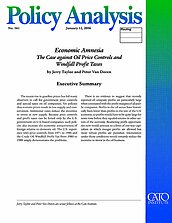The recent rise in gasoline prices has led many observers to call for government price controls and special taxes on oil companies. Yet policies that restrain prices result in less supply and conservation. Additional taxes reduce the incentive to invest in new supply. Because price controls and profit taxes can be levied only by the U.S. government on U.S.-based companies, such policies also increase the economic attractiveness of foreign relative to domestic oil. The U.S. experience with price controls from 1971 to 1980 and the Crude Oil Windfall Profit Tax from 1980 to 1988 amply demonstrates the problems.
There is no evidence to suggest that recently reported oil company profits are particularly large when contrasted with the profit margins of all public companies. Profits in the oil sector have historically been lower than profits in the rest of the U.S. economy, so profits would have to be quite large for some time before they equaled returns in other sectors of the economy. Restricting profit opportunities now would amount to a form of one-way capitalism in which meager profits are allowed but more robust profits are punished. Intervention under those conditions would certainly reduce the incentive to invest in the oil business.

This work is licensed under a Creative Commons Attribution-NonCommercial-ShareAlike 4.0 International License.


